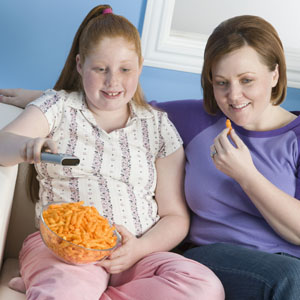Treatment
We are what we eat! Healthy eating means eating a large variety of foods from each part of the food pyramid and in the right amounts.
Healthy Eating:
We are what we eat! Healthy eating means eating a large variety of foods from each part of the food pyramid and in the right amounts. Remember that your child is not an adult and does not need adult-sized food portions!To make sure that your family eat healthy and nutritious food you first need to know what is in the foods that you buy. It’s important to learn how to read food labels as sometimes we don’t realise what’s really in our food. Learn more about food labels here:
http://www.nhs.uk/change4life/pages/food-labels.aspx

Breakfast
- Make sure that your child has a healthy breakfast everyday.
- If your child does not currently eat breakfast, encourage them to eat even a small amount. Lead by example by making sure you also have a healthy breakfast!
- A healthy breakfast should have fibre and no sugar. Avoid sugary cereals and go for cereals that are made from bran, wheat or oats.
Lunch
- Make sure that your child brings a healthy lunch to school and that their drink does not contain sugar.
- Avoid fizzy drinks and instead give them water or milk.
- Do not include treats such as bars or crisps in your child’s lunchbox
- A piece of fruit makes a perfect snack for little break
Dinner
- Make dinners that are low in fat and that contain lots of vegetables
- Sit down together for dinner and turn off the television
- For drinks, use water or milk.
- Try to include as much homemade food as possible as processed foods usually contain higher amounts of fat, salt and sugar.
- Limit take-aways to occasional treats
If you need help on cooking healthier food, try this nifty Meal Mixer!
http://www.nhs.uk/Change4Life/Pages/meal-planner-recipe-finder.aspx
Physical Activity:
Physical activity is MEDICINE! Physical activity and movement is essential for healthy child growth and development. Your child needs activity every day to make sure that his/her heart and lungs develop properly, to make sure that his/her bones and muscles are strong and so that he/she can play as much as possible. Every child needs at least 60 minutes of physical activity each day and this activity should be moderate to vigorous in intensity. This means that they should be doing 60 minutes of activity that makes them start to sweat and get warm. Depending on the age of your child, he/she may need more physical activity each day in order to grow healthily.
2-4 years
Being physically active is one of the most important jobs for toddlers and pre-school children! It is important for children at this age to be active for at least 3 hours each day. As the child’s heart and lungs are still developing, it is important to do lots of short bouts (blocks) of activity lasting 5-15 minutes each time. Parents should provide their children with opportunities for structured play* for at least 30 mins per day AND at LEAST 60 mins (and up to several hours) of unstructured** play and activity.Children at this age should NEVER sit for more than 60 minutes (except if they are sleeping). It is every parent and care-giver’s responsibility to understand the importance of activity and play. By 2 years of age children are on the move and are busy exploring the world around them, so supervision is essential at all times. At this age children will be able to follow two or three-step directions; sort objects and play ‘pretend’ games. Physical activity and play at this age should build movement skill so that the developing child enjoys moving and exploring the world around them.
As the child’s brain is developing at a rapid pace, children need to experience the world around them through ‘doing’ rather than ‘watching’. Parents should limit screen-time (TV, DVDs, phones etc) to no more than 1-2 hours per day. For some ideas on how to be active with your child, visit: Get Ireland Active: http://www.getirelandactive.ie/ Fun Generator http://www.nhs.uk/change4life/pages/fun-generator.aspx

5-8 years
Children at this age should be active for at LEAST 60 mins each day and up to several hours. It is important that they get a chance to try out lots of different games and sports. They should be active in bouts (blocks) of activity lasting 15 minutes or more. They should not be inactive for more than 2 hours per day so plan what TV programmes they will watch at the beginning of the week and limit the time for playing computer.It is important that activity at this age includes some moderate activity and some vigorous activity. Moderate activity is where the heart beats faster, the cheeks turn pink and where the child can still talk during the activity. Vigorous activity is where the child is unable to have a conversation, the heart is beating faster and they are warm and sweaty For some ideas on how to be active with your child, visit:
Move4Health http://move4health.ie/
Fun Generator http://www.nhs.uk/change4life/pages/fun-generator.aspx

8+ years
Children at this age should be active for at LEAST 60 mins each day and up to several hours. They should be active in bouts (blocks) of activity lasting 15 minutes or more. They should not be inactive for more than 2 hours per day so plan what TV programmes they will watch at the beginning of the week and limit the time for playing computer. At this age, the child has perfected most movement skills like balancing; hopping; skipping and jumping. It is important that they get a chance to try out lots of different games and sports and find the ones that they enjoy. It is important that activity at this age includes some moderate activity and some vigorous activity. Moderate activity is where the heart beats faster, the cheeks turn pink and where the child can still talk during the activity.Vigorous activity is where the child is unable to have a conversation, the heart is beating faster and they are warm and sweaty For some ideas on how to be active with your child, visit:
Move4Health http://move4health.ie/
Fun Generator http://www.nhs.uk/change4life/pages/fun-generator.aspx

Healthy Sleeping
Every living creature needs sleep as it is the time when the body regenerates itself. Sleep is important for children as it effects their mental and physical development. During sleep, your child’s body releases hormones needed for growth. In fact, your child grows during the night while he/she is asleep! It can be a challenge to establish good sleeping routines at home but the effort is worth it.Each child is different however in general:
- Children who are 3-5 years need about 11-12 hours of sleep each night
- Primary school children need between 10 and 12 hours of sleep each night
- Teenagers need 9-10 hours sleep each night.
If children don’t get enough sleep, they can have reduced concentration, reduced short-term memory and delayed response time. Sleep can be affected for many reasons. Homework, sports and after-school activities, TVs, computers, and video games, as well as hectic family schedules can get in the way of your child’s sleep.
Lack of sleep can cause irritable types of behavior and may make it difficult for your child to pay attention in school. It is important to have a consistent bedtime, especially on school nights. Be sure to leave enough time before bed to allow your child to unwind before sleep.

Screen time
Children nowadays spend much of their free time on computers, phones, video consoles and other devices with ‘screens’. Research has shown that sitting and using screens for more than two hours each day is bad for our health. It’s important to know how much time your child spends playing video games, watching TV, using their phone or using the Internet.It is recommended that children under age 2 have no screen time, and that children older than 2 years spend no more than 1-2 hours of free-time using screens.
Add up the time your child spends in these activities on an average day. If the total time is more than the recommended amount for their age, make changes now as we know that sitting more than 2 hours per day is bad for our health (increases blood pressure and cholesterol).

Remember that in your home, PARENTS make the rules. Try the following in order to keep screen-time within healthy limits at home.
- Decide on a time in the evening that all screens will be turned off.
- Keep TVs out of kids' bedrooms.
- Turn off the TV during meals.
- Don't allow your child to watch TV while doing homework.
- Have a rule where screen-time is allowed only after chores and homework are completed.
- Encourage your child to do alternative activities such as going to the playground, drawing, painting or a trip to the swimming pool.
If you cannot access a service in your local area, the W82GO programme may be suitable for you. The Temple Street W82GO offers a family-centered approach to help your child:
- Become more healthy
- Make and enjoy healthier food choices
- Become more physically active
- Solve problems that contribute to unhealthy eating
- Have a better self-image
- Avoid or resolve weight-related medical problems
We also aim to increase parents’ skills in managing their children’s eating habits and activity habits. Our multidisciplinary team works together with each family to achieve their goals. To see what other children and parents have said about the programme see our testimonial page.


